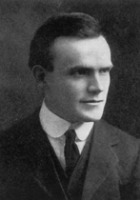England To France Poem by Alfred Gordon
England To France
O France! On this dire anniversary
After what fashion should we sing to thee?
Or should we sing?
Or if one sang in such an hour, should we?
For, in times past, how often have we said
But vanity and folly crowned thy head,
And that in thee there was no stable thing?
Yet thou didst judge us with like jaundiced eyes–
A people gloomy as their own grey skies,
Whom neither love
Nor hate nor fear nor death might agonise:
That never new a lifetime in one kiss;
Deaf to all rhapsody of woe or bliss,
Of Hell beneath them, or of Heaven above.
For perfidy we were to thee a name,
As thou to us for all licentious shame,
Until that day
All such loose folly was consumed with flame:
But now, howe'er the tide of battle run,
This year for us an era has begun
Which shall not soon or lightly pass away.
As lovers' quarrels now stand forth revealed
The petty wrangles that we kept unhealed
In jealous pride,
But now for ever and for ever sealed;
Only the wasted past shall we now rue,
The love unowned which yet at heart we knew,
And which from now shall never be denied.
As Sidney hailed thee in thy fame gone by,
'France, that sweet enemy!' So now we cry,
'France, that sweet friend!'
Yet, as of old, a Queen; with fame more high.
Sweet friend for ever, yet on this high day
A Queen in meet and glorious array
To whom in homage all the nations bend.
O France! Fair land of sunlight and the vine,
To whom illusion and romance were wine,
By what new light,
High o'er the conflict, doth thy spirit shine?
We have grown old and outlived dangerous dreams,
While through thy veins the fire of youth yet streams–
How shall we praise thy calm restraint aright?
Girt by the sea, howe'er so greatly pressed,
Always secure we had one place of rest,
And well we doubt
If we or any had endured thy test:
Wherefore we praise thee as none else before,
And in our hearts a memory of thee store
That shall not fade till all the stars die out.
For thou not merely hast survived thine hour,
Not, in thy trial, but preserved thy power;
But hast come forth
From thine affliction with yet richer dower:
A strange, new strength thy spirit doth endue,
A strength unknown of nations hitherto–
Far from the fury of this day of wrath.
As of fair women purged by bitter ruth,
Who have outlived the passions of their youth
And find at length
Peace in the quiet sanctuaries of truth;
Who smile where once they laughed, and yet are seen
More beautiful than they have ever been
In any triumph of their former strength,
Who walk in ways so gracious and so still,
Whose mien so calm a majesty doth fill,
Their purpose seems
Not theirs, but part of the eternal will:
So thou, O France, before the world dost fight
Not for thyself alone, but that great light
In which the very flood of freedom streams.
That light indeed which always lighted thee,
Howe'er disguised or fitful it might be–
Aye, even when
The holiest things thou mad'st but mockery:
Falsehood for truth, in error, thou hast deemed,
But never the idea of truth blasphemed–
So that great light thou guardest once again.
There is no God, thou saidst, but never said
Thyself wast God, and power unlimited
Thy right divine,
That all the earth should tremble at thy tread:
Aye, with what laughter, sweetly terrible,
Voltaire had hurled this Anti-Christ to Hell,
Cleaving him shrewdly to the very chine.
How thine immortal soul in him had flamed
To see thy temples ruined and defamed;
What thing more crude
The lightning laughter of his scorn had claimed?
For though destruction overtake thy fanes,
Yet indestructible the faith remains,
Purged of its dross, and strengthened and renewed.
Barbarian hordes that have but one recourse,
How shall thy foes, O France, assail the source
Of that hid life,
Who think to slay the spirit by brute force?
Upon the glory of the past they war,
But, 't is the future that thou fightest for,
And that great glory which shall crown thy strife,
For lo! Whatever wounds are this day thine,
More clear through suffering doth thy spirit shine,
Made once again
For all mankind a standard and a sign:
Aye, as of old, o'er Terror and o'er Wrath,
The clarion cry of Liberty goes forth,
And, as of old, it doth not cry in vain!
This poem has not been translated into any other language yet.
I would like to translate this poem